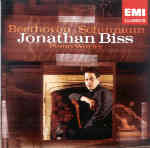At 23, pianist Jonathan Biss seems to have his career cards well stacked, studying with Leon Fleisher at the Curtis Institute, garnering a 2002 Gilmore Young Artists Award and an Avery Fisher Career Grant, and performing high-visibility concerto gigs with leading orchestras and conductors. Like Richard Goode and Murray Perahia (to mention previous Avery Fisher Career Grant winners), Biss is a virtuoso who places his well-schooled technique at the service of musical ideals. He approaches Schumann’s wild and wooly Davidsbündlertänze like chamber music for solo piano, treating the frequent instances of imitative writing as if the lines were emanating from different instruments. Repeats offer opportunities for Biss to effect subtle shifts in emphasis or voicing. However, compared to András Schiff’s dynamic intensity and giddy characterizations, Biss underplays the music’s volatile qualities (No. 16’s offbeat accents, No. 12’s laughing flourishes, or No. 10’s galloping “stride piano” effects, for example), and you hope that he’ll eventually inflect the lyrical movements more fancifully.
Similarly, Beethoven’s G minor Fantasy, essentially a written-out improvisation, is a more disturbing, uncouth piece of music than Biss’ extremely polished and worked out interpretation lets on. Not that there’s anything wrong with playing by the book on this pianist’s high level, but to hear Op. 77 foam at the mouth and spit buckets of blood as it should, the old Schnabel recording remains unsurpassed to this day. On the other hand, the Appassionata’s first movement goes like gangbusters! Biss gives the impression of a horse with blinders briskly charging through a bonfire, yet he’s actually quite scrupulous regarding dynamic scaling and rhythmic exactitude (notice, for example, how Biss resists the temptation to make crescendos in the introduction where none are written, as Pollini and Aimard do).
Like Rudolf Serkin, Biss rightly begins the central movement’s theme in neutral, but he seems unwilling to let each variation unfold and cumulate without manipulating the basic pulse. I wish the pianist’s power and kinetic drive in the first movement could have spilled over into the finale, which is clean and clear yet sacrifices excitement for precision (the coda doesn’t quite deliver on the movement’s earlier promise: no super-charged Richter payoff here!). Quibbles aside, there’s no doubt that we’re in the presence of an immensely talented and intelligent young pianist (note also his perceptive and succinct booklet notes), and I for one look forward to following his career in concert and on disc.
































